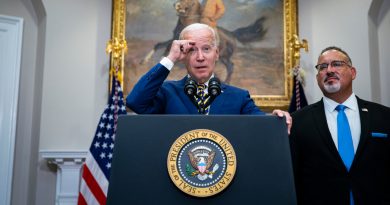How This Trump Impeachment Trial Compares With First
The same Senate chamber that was overrun by insurrectionists will become a somber court for Donald Trump’s impeachment trial, with senators sitting silently in judgment as they hear arguments that could make him the first president permanently disqualified from federal office. A year ago, following a three-week trial largely drama-free because its end result was never much in doubt, the Senate acquitted Trump of two articles of impeachment. Much is different this time around, not least because Trump is the first ex-president facing impeachment proceedings.
1. When does the Senate trial start?
House Speaker Nancy Pelosi said the article of impeachment passed by the House on Jan. 13, charging Trump with inciting the Jan. 6 insurrection, willbe delivered to the Senate on Monday. Senators will be sworn-in as jurors the next day. But opening arguments won’t begin until the week of Feb. 8, under an agreement between the Senate’s Democratic and Republican leaders designed to let lawmakers tend to other pressing business, such as confirming President Joe Biden’s cabinet nominees. The House impeachment managers who will prosecute the case and Trump’s defense team will have almost two weeks to prepare briefs. Even when the trial commences, there’s a chance that the Senate might continue doing other business.
2. Is the Senate allowed to do other business?
Senaterules set in 1986 guide the process, but leaders have a great deal of flexibility over the details, including how to balance the trial with other national priorities. Biden and many congressional Democrats are pressing for the Senate to use that discretion to split its time to simultaneously act on cabinet confirmations and Biden’s proposed$1.9 trillion virus-relief package. The chamber conducted limited legislative business during the six-week impeachment trial of President Bill Clinton in 1999, according to aCongressional Research Service report.
3. What will a typical trial day look like?
According to Senate rules, each day of the impeachment trial must begin at noon unless otherwise agreed to and run six days a week, breaking only on Sundays. That timing would allow for the Senate to conduct other business if there is an agreement between the party leaders, Democrat Chuck Schumer and Republican Mitch McConnell.
4. Who’s in charge?
The Constitution calls for the chief justice of the U.S. to preside over a presidential impeachment trial, as John Roberts did for Trump’s trial last year. But McConnell told Republican colleagues it is unclear whether Roberts is required to do so in the case of a former president. If Roberts doesn’t preside, that role could fall either to Vice President Kamala Harris, whose official roles include Senate president, or to Senator Patrick Leahy of Vermont, who, as the senior member of the majority Democratic Party, is the Senate’spresident pro tempore, or “president for the time being” when the vice president is elsewhere.
5. What happens in case of tie votes?
Schumer is majority leader in the 50-50 Senate because any tie-breaking votes would be cast by Harris, a fellow Democrat. During Trump’s first trial last year, Roberts declared that he interpreted the Constitution as preventing him from breaking a tie, should the Senate deadlock 50-50 on a procedural matter such as whether to call a witness or accept a piece of evidence. If Harris presides, she can break a tie. (Under Senate rules, a motion fails in the event of a tie.)
6. Who will present the case for the House?
The House managers who function as prosecutors will be led by Maryland Representative Jamie Raskin, who is a member of the House Judiciary Committee and a professor of constitutional law. Other managers include Diana DeGette of Colorado, David Cicilline of Rhode Island, Joaquin Castro of Texas, Eric Swalwell and Ted Lieu of California, Stacey Plaskett of the U.S. Virgin Islands and Madeleine Dean of Pennsylvania. Outside lawyers Barry Berke and Joshua Matz, who helped present the House’s case against Trump in his first trial, have been hired to help with the second one.
7. Who will defend Trump?
Trump hired South Carolina lawyerButch Bowers, who has worked on high-profile voting and election matters, to be part of his legal team. At his first trial, Trump’s defense teamincluded several notable lawyers including former Florida Attorney General Pam Bondi, former independent counsels Ken Starr and Robert Ray, and retired Harvard Law Professor Alan Dershowitz.
8. Will there be witnesses?
In last year’s Trump trial, the Senate’s Republican majority rejected attempts by Democrats to call witnesses to support their case that Trump had abused the power of his office inpressuring Ukraine’s president to dig up dirt on Biden, who was then emerging as a likely Trump political challenger. In Clinton’s impeachment trial, the Republican-controlled Senate voted to hear testimony from Monica Lewinsky, the White House intern who had a sexual relationship with the president, as well as testimony from two other Clinton associates. Democrats haven’t yet said what witnesses, if any, they want to offer testimony in the upcoming trial. No witnesses were called to testify in the House, where Democrats made the case that Trump had essentially incited and supported insurrection in public view.
9. How does the trial start?
In Clinton’s trial, and Trump’s first trial, House managers and the president’s defense attorneys each were given up to 24 hours of floor time to make opening arguments — over the course of four days in Clinton’s case, three days in Trump’s. Senators then were granted 16 hours to ask questions of the teams, posed in written notes and read aloud by the chief justice.
10. What do the senators do?
Sit and listen, mostly, which is a departure from the normal way the Senate floor operates. When House managers present the impeachment article, the sergeant-at-arms is required to read a proclamation: “All persons are commanded to keep silence, on pain of imprisonment.” On a normal day in the Senate, members often address an empty chamber, their comments primarily geared for theC-Span camera. During Trump’s trial last year, senators sat at their desks through long nights of impeachment proceedings. To make sure they paid attention, they were forbidden from carrying phones and other electronic devices into the chamber. Large cubbyholes were installed outside the chamber and in cloakrooms to store electronics. At the start of the trial, each senator swears an oath “to do impartial justice.”
The Reference Shelf
- The Congressional Research Servicereport, “The Impeachment Process in the Senate.”
- Trumpstruggled to find lawyers as his second impeachment trial neared.
- QuickTake explainers on thepurpose and legality of holding an impeachment trial for an ex-president, and onlegal terms such as insurrection and sedition.
- Bloomberg Opinion columnist Cass R. Sunstein says seditionis an appropriate term for the riot at the Capitol.
Source: Read Full Article


